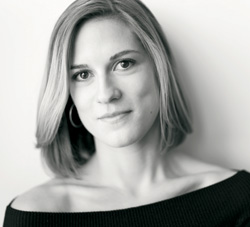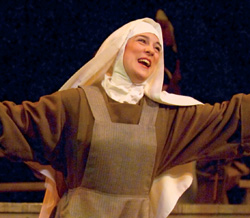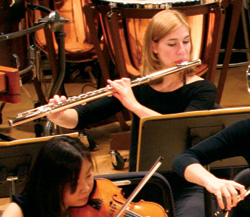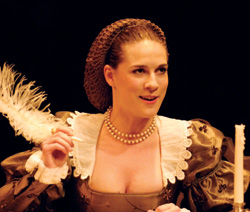
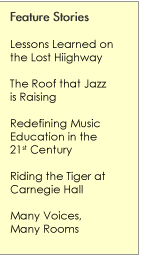
|
| Home :: Features :: Many Voices, Many Rooms Many Voices, Many Rooms By Alice Teyssier ’06
Whenever I greet prospective Oberlin students and their parents at the Conservatory admissions office, where I am a student intern, I am often asked, “So, why did you choose Oberlin?” This daunting question inspires me to reflect on the decision I made nearly five years ago: I came here because I was given the opportunity to simultaneously study my two favorite musical pursuits, flute and singing. Before coming to Oberlin, I was enrolled in the University of Minnesota Ferguson School of Music’s Post-Secondary Enrollment Options Program for high school students. I studied flute with Immanuel Davis and singing with Lawrence Weller, both of whom encouraged my application to Oberlin. When I was accepted as a double major, many people thought I would eventually choose one over the other. But I didn’t, in part because the double course of study that would normally take five years took only four, thanks to the numerous academic credits I was able to transfer from the Ferguson program and the help of Associate Dean Marci Alegant in devising a curriculum focused on the core musical requirements for both majors.
In the Studio and Practice Room Besides the chance to continue both instruments, the main advantage Oberlin offered was the opportunity to study with two major teachers. Professor of Flute Michel Debost is a legendary performer who has taught hundreds of flutists in France and at Oberlin. The life lessons he imparts through his deep care and concern for his students makes him one of the most inspiring people I have ever met. Associate Professor of Singing Lorraine Manz [see “The Prismatic Career of Lorraine Manz” on page 42 of this issue] has helped me develop my own healthy, vibrant sound and find repertoire in which I can blossom. Her constant challenging and pushing, balanced by the genuine smiles she flashes after studio class performances, have created a setting conducive to progress. I cannot imagine having made better choices: Professors Debost and Manz have taken me under their wings, guided me, and led me to a place where I feel ready to present myself to the world. I cannot thank them enough. Many people ask if maintaining a practice schedule on two instruments is difficult. Besides keeping up with both majors, I’ve worked at least one job during each academic year, and I teach flute and singing. But Conservatory life, so close to the practice rooms, simplifies everything. Professor Debost’s lesson plan involves very quick studies of difficult pieces, and I find myself working on the daily ritual of Scale Game, an exercise devised by Debost and well-known to all of his students and fans, and on a new piece every week or two; the structure inherent in his program makes for an efficient practice session. I divide my vocal practice into two half-hour-long periods each day to avoid fatigue and other vocal difficulties. Challenges and Rewards
My time at Oberlin has been filled with memorable events, wonderful friends, and music of all kinds. Each year offered different challenges and rewards that shaped me into the person I am today. My first year, I played with a fantastic woodwind quintet. I also performed with the Oberlin Orchestra, playing principal flute in Brahms’ Symphony No. 1, which has a beautiful flute solo in the fourth movement. (I could not have been more nervous!) I performed a rarely heard set of Jacques Leguerney songs in a Division of Vocal Studies recital. My interest in foreign languages, coupled with my vocal studies requirements, factored into my decisions to live at French House (I enjoyed it so much that I decided to become the resident assistant there my sophomore year) and to spend the summer before my sophomore year traveling alone in Germany, learning the language and seeing the country. I started participating in various ensembles in my sophomore year: I was involved in the opera workshop, preparing scenes from various operas, and played in the Contemporary Music Ensemble and the Oberlin Orchestra. That year was difficult; I had a heavy course load and emotional demands in my work and personal lives. I started noticing problems occurring between singing and playing. Professor Manz and I discovered that too much flute playing made me tired for singing and desiccated my vocal tract. I slowly learned how to better warm up vocally and pace my flute practice in relation to how much singing I needed to do. Those coping mechanisms started to pay off in my junior year, when I was involved in both operas and performed a vocal solo with the Contemporary Music Ensemble. For winter term, I took part in the Conservatory’s annual Panama Project, teaching and performing at a music camp for young musicians. This experience, replete with salsa dancing, new foods, tropical escapades, and practicing Spanish, fueled my love of teaching and traveling. My recitals were the highlights of my time at Oberlin. Both of my junior recitals involved instrumental groups and repertoire with which I felt very close. In my senior flute recital, I focused on the evolution of flute music in France, expanding on my experiences in Baroque flute, which I studied for two years with Teacher of Baroque Flute Kathie Lynn Stewart, and on contemporary music. My voice recital was an intimate concert in which I worked very closely with my wonderful piano collaborator, Sungha Lee ’07.
My senior year was especially rewarding. I was cast in lead roles in both Oberlin Opera Theater productions: Dialogues of the Carmelites in the fall and The Merry Wives of Windsor in the spring. Under the encouraging and challenging direction of Visiting Assistant Professor of Opera Theater Sally Stunkel, I grew enormously as a singer and actress. I traveled—with all of my flutes—to New York City (twice!) with the Contem-porary Music Ensemble, where enthusiastic audiences and reviewers at Merkin Hall and Miller Theatre received the group. What Next? I completed my double major in May 2006, but remained in Oberlin to study with Associate Professor of Opera Theater Jonathon Field in the Conservatory’s Master of Music in Opera Theater program, where I’ve gained the freedom and skills to become a music scholar as well as performer; my thesis focuses on the incorporation of projections and video on the operatic stage. I saw such a staging first-hand in Oberlin’s U.S. premiere of Lost Highway, in which I performed the lead female role. [See “Lessons Learned on the Lost Highway” on page 18 of this issue.] I am keeping up with my flute playing, performing with Echoi, the contemporary music sextet I cofounded a year and a half ago, and I am starting to audition for various ensembles, positions, and programs and considering multiple career splits: between the United States and Europe, baroque and contemporary music, singing and playing. I am so grateful to have been able to pursue my two passions as deeply as I have; Oberlin has been the perfect trampoline into many different opportunities and experiences. |
